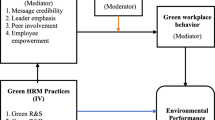Abstract
The current work aims at exploring green workplace practices that trigger environmentally friendly changes, leading to an increase in workforces’ productivity among energy organizations. Green work settings globally, are environmentally sensitive, resource efficient and socially responsible. Green work strategies, when well deployed, can make office practices more sustainable, efficient and well suited to the complex, ever-changing world of business. Indeed, evidence abound that, modern organizations enhance business profitability and long-run marketability, while reducing costs and increasing productivity through greener practices. Research overwhelmingly shows that eco-friendly offices and green environmental practices among energy organizations translate to a happier, healthier and more efficient employees. Drawing on a qualitative, multiple-case study approach, primary data were collected from selected energy organizations in Ghana, using interviews and document archival sources. The paper showed green work environmental awareness initiatives being embarked by the energy organizations. The results further showed how the energy organizations are adopting environmentally friendly practices, resource-efficient initiatives and socially responsible actions to enhance productivity. The results also point to the various energy organizations embarking on environmental audits to understand their initial situations and using such audit results to create workplace environmental policies and procedures for sustainability that is geared towards minimizing negative impact of their activities on the environment. The paper has practical implications for clean energy, competitive and sustainable energy operations as well as a more productive workforce. The paper recommends an adoption of holistic green work environment practices as a priority to leverage lean energy production, transmission and distribution across the various energy organizations in Ghana.
Access this chapter
Tax calculation will be finalised at checkout
Purchases are for personal use only
Similar content being viewed by others
References
Ministry of Energy Ghana (2017)
MiDA: Outage Management System (OMS) Implementation Electricity Company of Ghana (ECG)/Power Distribution Services Ghana Limited (PDS), Ghana (2019)
Amoah, D.: Get it right! Engineering Guide for Electricity Consumers. Power and Glory Publishers, Mamprobi-Accra (2018)
Stringer, L.: The Green Workplace: Sustainable Strategies that Benefit Employees, the Environment, and the Bottom Line. Macmillan, New York (2009)
Dutta, S.: Greening people: a strategic dimension. ZENITH Int. J. Bus. Econ. Manag. Res. 2, 143–148 (2012)
UNEP: Towards a Green Economy: Pathways to Sustainable Development and Poverty Eradication. United Nations Environment (2011)
Murari, K., Bhandari, M.: Green HR: going green with pride. J. Soc. Welf. Manag. 3, 107–110 (2011)
Daily, B., Huang, S.: Achieving sustainability through attention to human resource factors in environmental management. Int. J. Oper. Prod. Manag. 21, 1539–1552 (2001)
Haden, S.S.P., Oyler, J.D., Humphrey, J.H.: Historical, practical, and theoretical perspectives on green management. Explor. Anal. Manag. Decis. 47, 1041–1055 (2009)
Cherian, J., Jacob, J.: A study of green HR practices and its effective implementation in the organization: a review. Int. J. Bus. Manag. 7, 25–33 (2012)
Clem, W.: 5 things you need to know about going green. http://www.greencar.com/articles/5-things-need-going-green.php. Accessed 8 Sept. 2008
Society for human resources management – (SHRM): Employees Benefits. How competitive is your organization? (2008)
Acknowledgements
The authors are grateful to the members of the energy organizations of Ghana (GRIDCo, VRA and ECG) for the sacrifice of time, space and energy for the interviews. The authors would like to thank the Women in Energy Ghana for participation, and the Human Resource Personnel at the ECG project office for the access to the participants. However, no funding was received for the study.
Author information
Authors and Affiliations
Corresponding author
Editor information
Editors and Affiliations
Rights and permissions
Copyright information
© 2020 The Editor(s) (if applicable) and The Author(s), under exclusive license to Springer Nature Switzerland AG
About this paper
Cite this paper
Kilu, R.H., Sanda, MA. (2020). Green Work Environments and Workforce Productivity Among Energy Organizations in Ghana. In: Nunes, I. (eds) Advances in Human Factors and Systems Interaction. AHFE 2020. Advances in Intelligent Systems and Computing, vol 1207. Springer, Cham. https://doi.org/10.1007/978-3-030-51369-6_22
Download citation
DOI: https://doi.org/10.1007/978-3-030-51369-6_22
Published:
Publisher Name: Springer, Cham
Print ISBN: 978-3-030-51368-9
Online ISBN: 978-3-030-51369-6
eBook Packages: EngineeringEngineering (R0)




